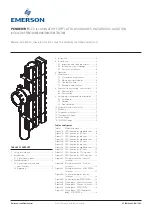
19
HARDWARE ALIGNMENT
This section describes how to determine and set the audio levels. Midian has already determined the best audio
levels for some models of radios. These levels are on the following page in the tables. If you wish to alter the
levels please follow the instructions below.
Audio Levels Overview:
To ensure the best audio quality, the unit must be configured to match the audio levels used by the radio. The
SVR uses programmable gain amplifiers to accomplish this. Determining the gain settings for these amplifiers is
an involved process, so Midian simplified this process by developing an algorithm that requires the technician to
make only four voltage measurements. From these four measurements, all of the many internal settings are
determined.
Still, getting the best audio quality will likely require a bit of trial and error. The SVR only has control of audio
voltage levels, not input and output impedances. These impedances can dramatically influence the levels.
The Four Voltage Measurements:
An oscilloscope and a communications test set/service monitor are required for the measurements. It is
recommended that the measurements be recorded in units of mV peak-to-peak. Each measurement must be
taken with system modulation at either 60% or 100%, but Midian recommends using 60%
These measurements must be taken within 15 seconds of powering on the unit. This is because the unit will enter
power saving mode after that time. Measurements made while the unit is in power saving mode will not be valid.
TX Alignment Set-Up:
A method for controlling transmit modulation is required for accurate measurements in the
TX mode. A small speaker held in place near the microphone by a rubber band can serve this purpose in most
cases. Use a sine-wave generator to inject a 1000 Hz tone into the speaker. Adjust the output of the sine wave
generator so that the transmitter produces 60% of rated modulation while PTT is pressed. Note that if the audio
source (such as a speaker) is moved even slightly, the TX modulation may change significantly. Care must be
taken to avoid changing the TX modulation while taking the measurements.
RX Alignment Set-Up:
Using a service monitor send a fully quieting signal (-50 dBm) to the receiver with a 1000
Hz tone at 60% modulation, adjust the volume of the receiver to a comfortable listening level and measure the
audio level at the speaker using an AC coupled oscilloscope. Once the volume is adjusted and the measurement
taken do not adjust the volume control during the remainder of the alignment.
1.
TX Input:
The goal of this procedure is to determine the audio level that the unit will see at the TX audio
pickup point after it is installed. The unit must be installed and powered-on while making this measurement.
Use the TX Alignment Set-Up procedure and measure the audio level at TP1 on the unit.
2.
RX Input:
The goal of this procedure is to determine the audio level that the unit will see at the RX audio
pickup point after it is installed. The unit must be installed and powered-on while making this measurement.
Use the TX Alignment Set-Up procedure and measure the audio level at TP2 on the unit.
3. In the SVR programming software under audio levels set the TX In to the same level as measured in step 1
and for a preliminary adjustment set the TX Out for the same level. Set the RX In to the same level as
measured in step 2 and for a preliminary adjustment set the RX Out for the same level. Program the unit.
4.
RX Output:
The goal of this procedure is to determine the audio level that would normally appear at the RX
audio insertion point in an unmodified radio. Using the same RX Alignment Set-Up procedure verify the audio
level at the speaker is still at the same level measured initially in the RX Alignment Set-Up procedure. If not
adjust the RX Out level accordingly.
5.
TX Output:
The goal of this procedure is to determine the audio level that would normally appear at the TX
audio insertion point in an unmodified radio. Using the same TX Alignment Set-Up procedure verify the
modulation is still at 60%, if not adjust the TX Out level accordingly.








































